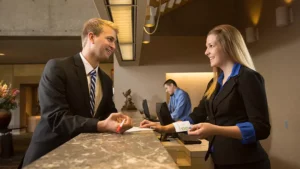In the hotel industry, nothing is more important than on-time, respectful, and clear communication with customers. A five-star hotel or a boutique property, success most often depends on one thing: customer communication in hotel settings. How a hotel approaches communication with customers can have straightforward effects on customer satisfaction, retention, and long-term reputation.
Here, in this blog, we talk about why hotel guest communication is so critical, how one can improve it, and how it affects guest experience and business outcomes.
Building a Strong Foundation Through Guest Communication

Good communication is effective and clear. When hotels concentrate on guest communication in hotel operations, they create stronger relationships, fewer miscommunications, and higher guest satisfaction. The building of a good guest experience begins pre-check-in and continues long after check-out.
First Impressions and Pre-Arrival Conversations
The guest experience begins long before arrival. A pre-arrival welcome message, confirmation email, or support with pre-arrival questions already builds expectations. Effective communication with guests during hotel operations at this time creates anticipation and professionalism. Hotels that respond positively and respectfully build a sense of trust and care.
Check-In and Front Desk Interactions
The front desk is most often the first face-to-face interaction. A welcoming greeting and open information about amenities, policy, and services are important. This first contact establishes the tone for the personality of the hotel. Effective guest communication during hotel check-in reduces uncertainty and welcomes the guest immediately.
Real-Time Communication During the Stay
Guests may need to ask for housekeeping, request restaurant information around town, or request maintenance. All of these are breaking points. Response within a time limit shows respect and readiness. Guest-to-guest communication in real time, through face-to-face interaction, telephone, or text messages, makes the guests feel attended to and understood.
Strengthening Hotel Reputation Through Communication
Good experiences don’t only create positive reviews—they make hotels distinct in a competitive industry. Impeccable guest communication in hotel operations is the key to how guests judge service quality and whether they will endorse the property to others.
Handling Complaints Professionally

Not everything goes as planned while having a guest stay. Slow internet, noisy guests, or late housekeeping upset guests. But complaint resolution is more significant than the complaint. Warm, polite, and solution-oriented responses speak volumes about good guest communication in hotel management.
Post-Stay Follow-Up and Feedback Collection
Communication is not always finished at check-out. Follow-up communication expressing appreciation to the guest or requesting feedback makes guests feel appreciated. The process also allows the management to learn from experience what was done wrong or done right. Routine guest communication during hotel follow-up aids in the retention of the guest and helps to create repeat loyal guests.
Word of Mouth and Online Reviews
Reputation now moves quickly on social media and review websites. Guests share whether they were treated well or not. Good guest communication during hotel stays often converts to positive online reviews, while bad communication can lead to irreparable damage. Communication is therefore embedded in a hotel’s public reputation.
Conclusion
Communication is the core of hospitality in each touch point of a guest’s experience. From first contact by email to post-stay questionnaires, a hotel’s dialogue with guests can make or break its business. In an aggressive market environment, it’s not about extravagant rooms or high-end amenities, but about having consistent, respectful, and thoughtful guest dialogue throughout hotel services.
Those hotels that are investing in their communication systems are investing in long-term growth. Building staff, employing technology, and listening to guests all help with enhanced guest satisfaction and reputation. If hotels are to differentiate themselves, they must put guest communication at the forefront of hotel management.
FAQs
Q: Why is guest communication so important to the hotel business?
Guest communication in hotel service builds confidence, reduces confusion, increases satisfaction, and enhances guest experience. It’s reputation- and loyalty-building.
Q: How does pre-arrival communication impact the guest experience?
It sets the tone for professionalism and care. Issuing welcome messages or confirmation emails makes the guest feel special and prepared prior to arrival.
Q: What should be emphasized by front desk agents during check-in communication?
They need to provide a warm welcome, clearly communicate hotel services and policies, and answer questions confidently. This first impression significantly affects guest satisfaction.
Q: How can hotels provide effective real-time communication during the length of stay of a guest?
Hotels can use multiple channels like face-to-face dialogue, phone, and messaging platforms to address the guest’s request or problem immediately and respectfully.
Q: What is the best approach to addressing guest complaints?
Listen carefully, stay calm, feel for the individual, and respond with a solution quickly. Professional complaint resolution is an indication of great guest communication in hotel management.
Q: Why is post-stay communication essential?
Follow-up with guests shows appreciation, stimulates feedback, and opens up opportunities for long-term loyalty and improved service.
Q: How does guest communication influence online reviews?
Being respectful and clear usually writes good reviews, whereas poor communication can generate negative feedback and harm reputation.
Q: Can guest communication improve hotel reputation in competitive markets?
Yes. Great communication is what differentiates a hotel from another and builds long-term guest loyalty and trust.
Q: What is the position of technology in guest communication currently?
Technology like automated messages, digital check-in, and guest service apps can expedite response, reduce errors, and increase convenience.
Q: How do hotels train staff to communicate with guests better?
Continual training, role-playing, feedback, and emphasizing empathy and listening enhance staff interactions with guests.
